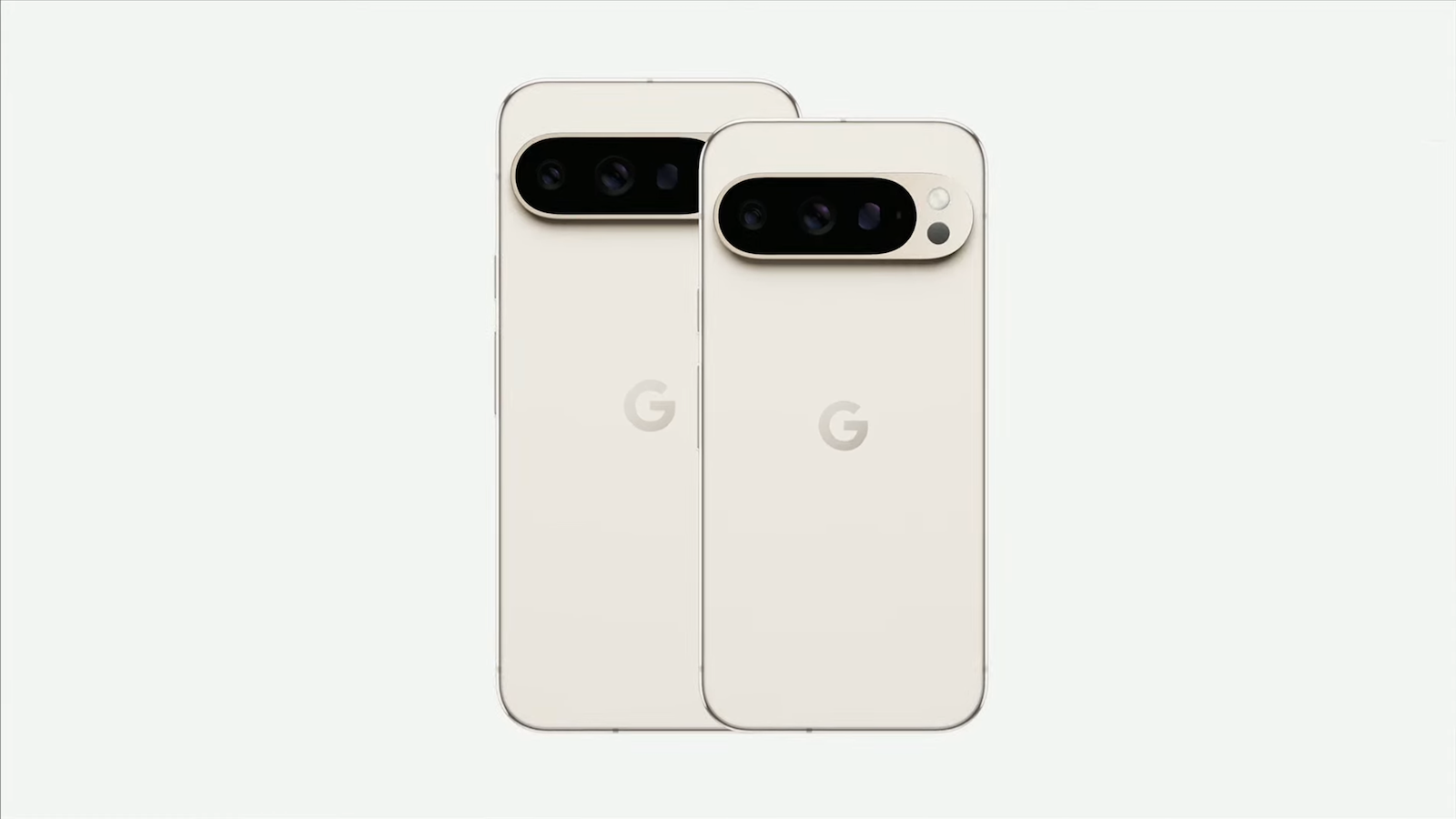
Just 10 short months since it launched the Pixel 8 series, Google has just taken the wraps off its successor, the Pixel 9 series.
While the Pixel 8 series consisted of two models, the Pixel 8 and Pixel 8 Pro, the new series consists of four models: the Pixel 9, Pixel 9 Pro, Pixel 9 Pro XL and Pixel 9 Pro Fold.
The names used might lead you to believe that the Pro XL is the main differentiator, but it's really the Pixel 9 Pro that's the new proposition as it offers Pro specs at a 'standard' size – if you wanted to go Pro last year, you had no choice but to also go big.
If it's the Pixel 9 Pro or Pixel 9 Pro XL you're interested in, here's everything you need to know.
Google Pixel 9 Pro and Pixel 9 Pro XL at a glance
- Pixel 9 Pro has a 6.3-inch display (slightly larger than the standard Pixel 9)
- Pixel 9 Pro XL has a 6.8-inch display (slightly larger than that of Pixel 8 Pro)
- Specs are otherwise the same
- Both models powered by the new Tensor G4 processor
- Prices start at £999 / $999 / AU$TBC for the Pixel 9 Pro
- Prices start at £1099 / $1099 / AU$1699 for the Pixel 9 Pro XL
Google Pixel 9 Pro release date
The Google Pixel 9 Pro and Pixel 9 Pro XL were announced during today's 'Made by Google' and pre-orders went live immediately. Deliveries will begin on 22nd August for the Pixel 9 Pro XL and in early September for the standard-sized model.
Google Pixel 9 Pro and Pixel 9 Pro XL prices
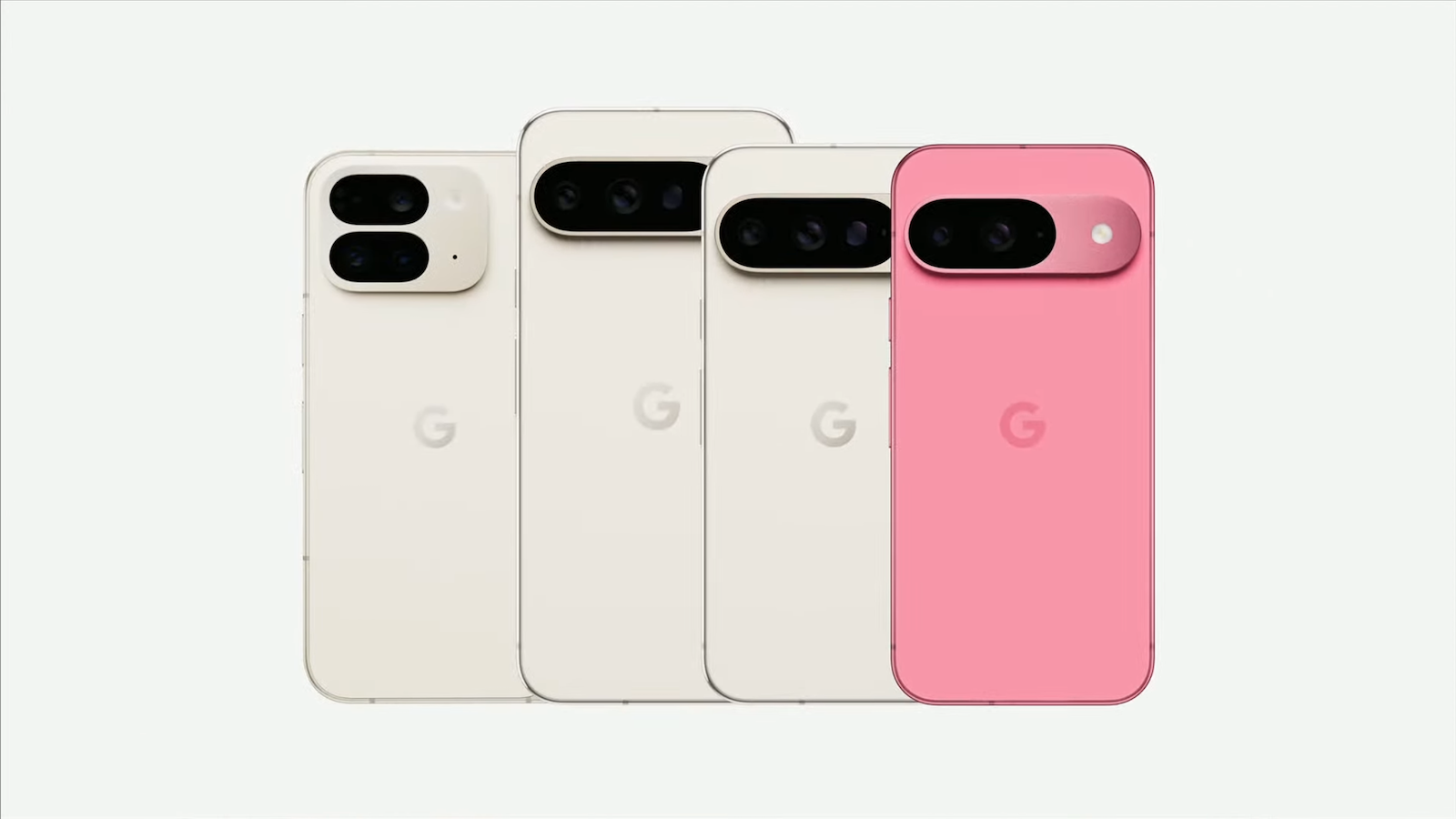
Pricing for the standard-sized Pixel 9 Pro starts at £999 / $999 / AU$TBC, whereas the larger Pixel 9 Pro XL is priced from £1099 / $1099 / AU$1699.
For reference, last year's Pixel 8 Pro, which was only available in a large size, launched at a price of £999 / $999 / AU$1699.
If you're wondering how the new Pixel 9 Pro models compare on price to Apple's iPhone 15 Pro handsets, it's very similarly. The standard iPhone 15 Pro is officially priced at £999 / $999 / AU$1849, whereas the iPhone 15 Pro Max is £1199 / $1199 / AU$2199.
Google Pixel 9 Pro design
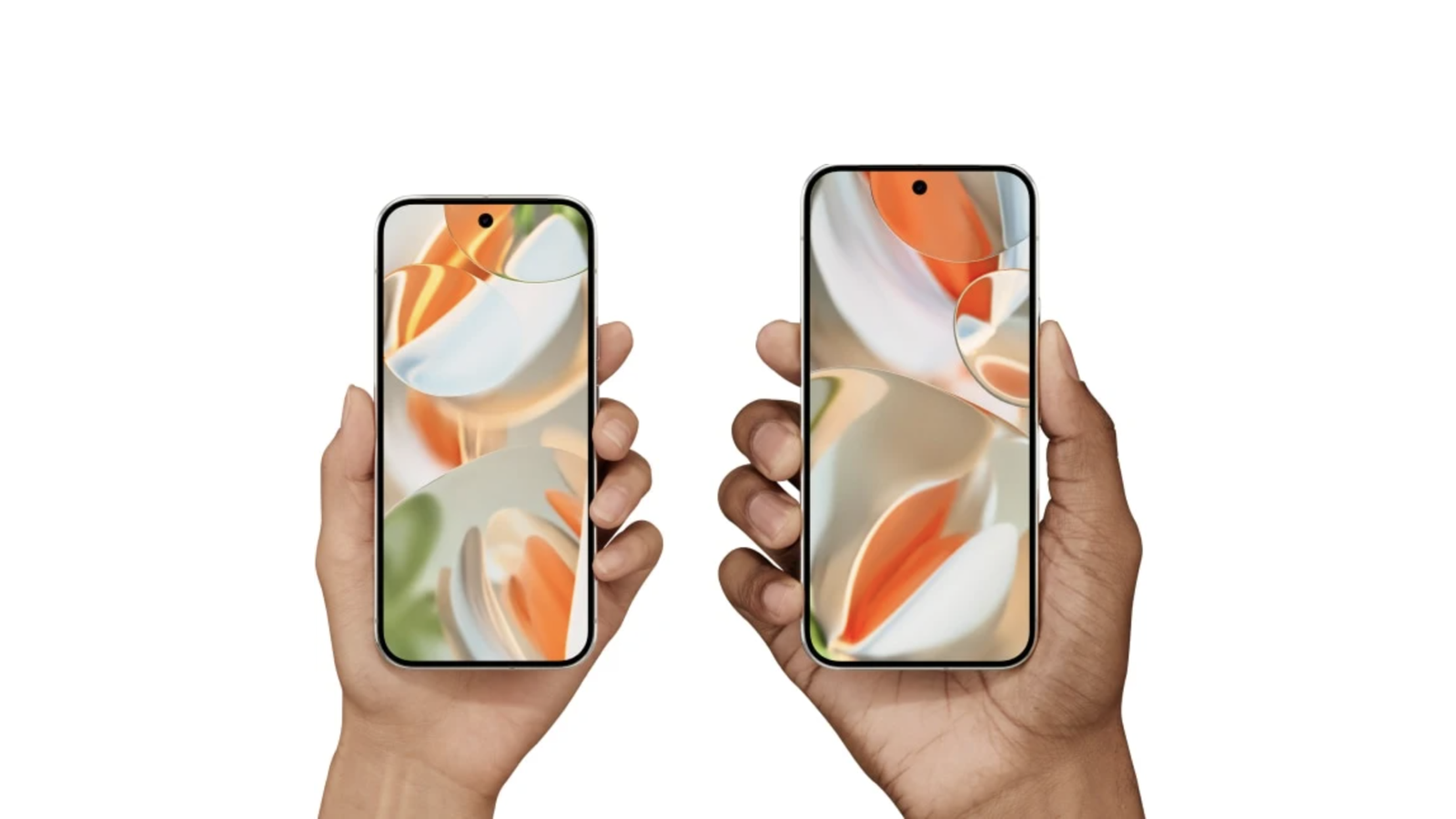
The new Pixel 9 phones are aesthetically a bit of a departure from previous models. The relatively soft and rounded design of before has been replaced by a more angular and straight-edged form that to these eyes looks more sophisticated but could have an impact on ergonomics. It also means that the new Pixels look more similar to iPhones than previous models did, which might not please all Android fans.
However, rather than switching to an iPhone-like camera cluster, Google is sticking with its camera bar concept, albeit with a new design. Rather than the bar stretching the whole width of the phone's rear and integrating with its edges, the new camera bar is a protruding oval with crisp edges. It's a more modern look that's still distinctly Google – you won't mistake the Pixel 9 Pro for a phone from any other brand.
The Pixel 9 Pro and Pro XL will be available in four colours, which Google calls Porcelain (grey), Obsidian (black), Rose Quartz (pink) and Hazel (green). These colours are very subtle compared to the brighter hues being used for the standard Pixel 9. That seems a shame to us (who says a 'pro' phone can't be colourful?), but it's a pretty standard approach across the smartphone industry.
Google Pixel 9 Pro and Pixel 9 Pro XL displays
Inevitably, it's the picture and sound quality that we're most interested in, and while little to nothing is currently known about the latter (Google made no mention of sound quality during the Made by Google event), we do of course know a fair bit about the displays.
The standard Pixel 9 Pro features a 6.3-inch display with a 2856 x 1280 resolution, which means it has a pixel density of 495 ppi (pixels per inch).
The Pixel 9 Pro XL, meanwhile, has a larger 6.8-inch display with a 2992 x 1344 resolution, giving it a very slightly lower pixel density of 486 ppi.
As you would expect at this level, both displays are OLEDs with a 120Hz refresh rate that can dynamically drop to as little as 1Hz to save battery when the image is largely static. They both also have a claimed peak full-screen brightness figure of 2000 nits with HDR content. That's up from 1600 nits on the Pixel 8.
These specs compare very favourably with those of the iPhone 15 Pro and iPhone 15 Pro Max. Each Pixel 9 Pro model has a larger display with a higher pixel density and claimed peak brightness figure than its iPhone equivalent. Of course, picture quality is about much more than just specs, particularly when it comes to watching movies and TV shows on the move, so it certainly wouldn't be sensible to assume that the screens of the Pixel 9 Pro and Pro XL are 'better' than those of the iPhone 15 Pro and Pro Max. As ever, we will thoroughly compare the phones ourselves before delivering any sort of verdict.
Google Pixel 9 Pro and Pixel 9 Pro XL processor and battery
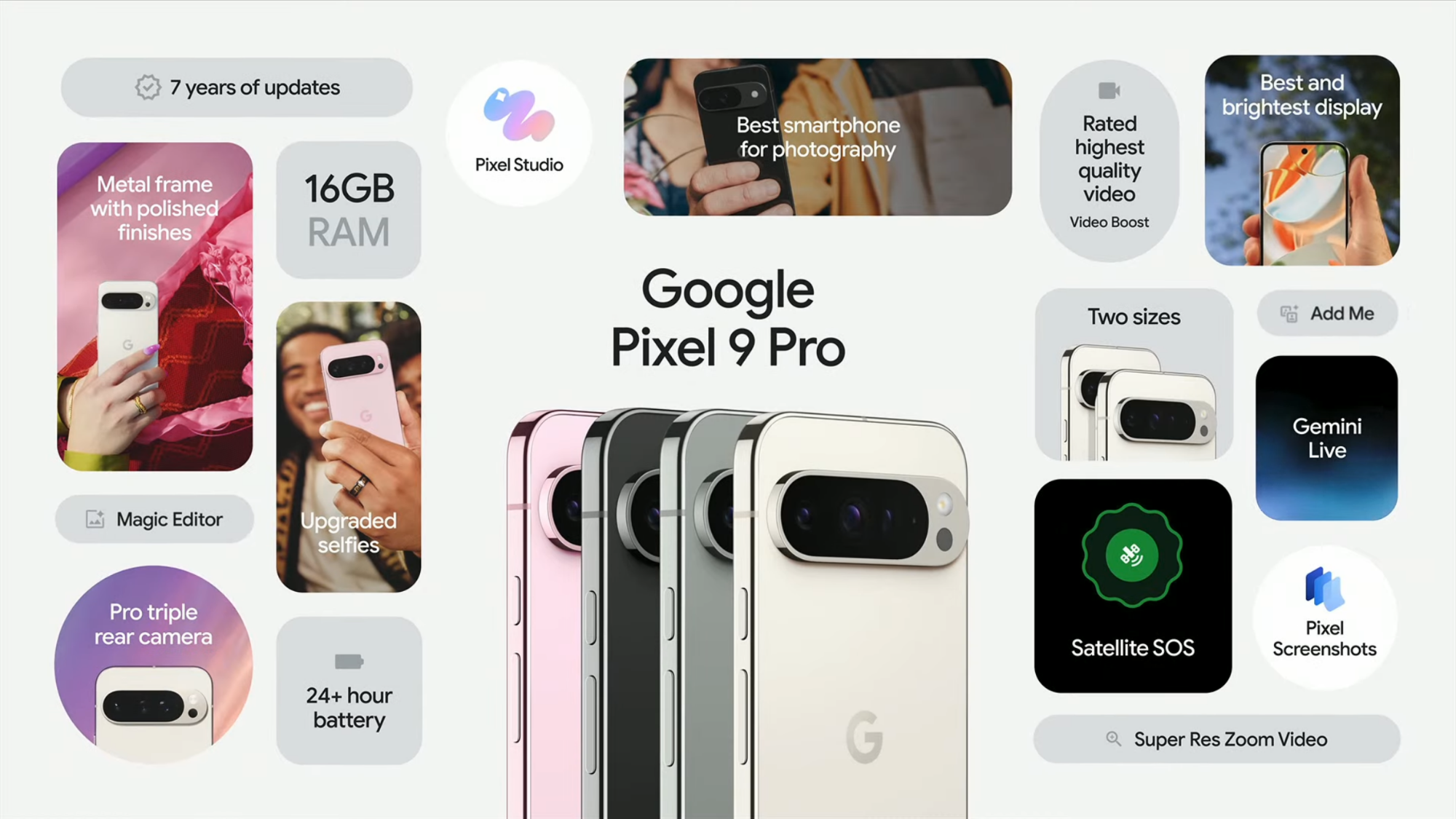
The Pixel 9 Pro and Pixel 9 Pro XL both feature the same Google Tensor G4 processor. As you would expect of any new processor in 2024, Google is talking up the Tensor G4's AI smarts, which should be most keenly felt through the Google Assistant and photography, but also in specific apps such as Pixel Screenshots, which can analyse screenshots and translate and save the info for access whenever you need it
Both phones have 16GB of RAM and are available with 128GB, 256GB, 512GB or 1TB of storage.
The larger Pixel Pro 9 XL also comes with a larger battery than the standard 9 Pro (5060mAh versus 4700mAh), but Google is claiming the same 24+ hours of constant use for both.
Google Pixel 9 Pro and Pixel 9 Pro XL cameras
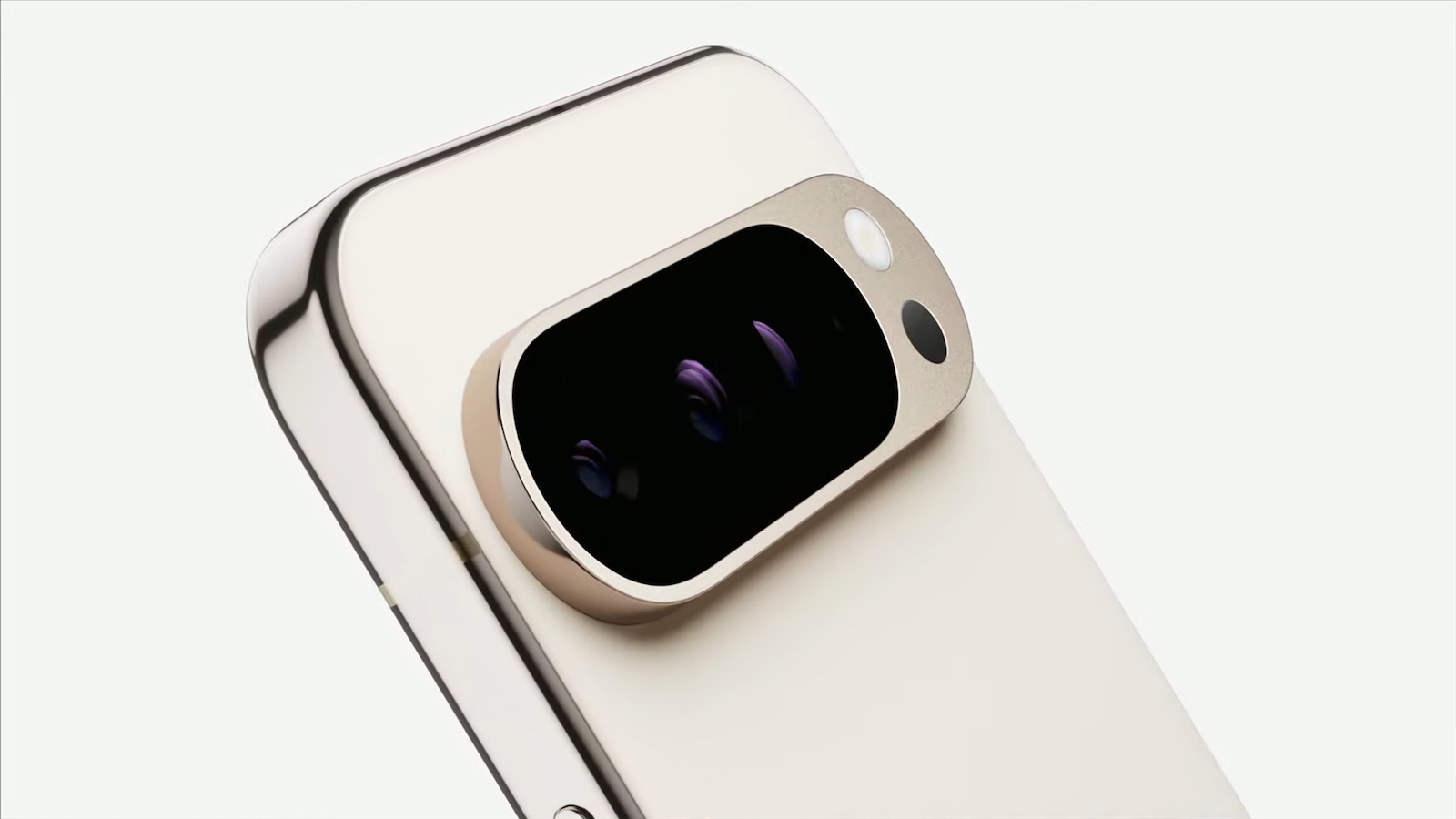
The Pixel 9 Pro and Pixel 9 Pro XL feature identical cameras. On the rear is a triple-threat camera system that includes a 50MP main sensor, 48MP ultra-wide sensor and a 48MP telephoto lens. In sensor terms, this camera system is very similar to that of the Pixel 8 Pro, but Google says that a lot of improvements have been made to the rest of the camera software and hardware, resulting in far better photography results, particularly in low light conditions.
A much bigger sensor upgrade has been made to the front camera, though, with the 10.5MP lens of the Pixel 8 Pro having been replaced by a 42MP lens. That should make for much better selfies and video calls.
Google Pixel 9 Pro first thoughts
On paper, the new Pixel 9 Pro models look like a useful upgrade on the Pixel 8 Pro in some areas. There's the availability of a smaller model, of course, which will be a big deal to those who want a 'pro' performance in a more manageable size, but there are also upgrades to the cameras and processing.
Display upgrades are thinner on the ground, at least where the numbers are concerned, but a good movie performance is about more than numbers, so we're hopeful that there are improvements that the spec sheet doesn't show. Last year's Pixel 8 Pro put in a solid movie performance but it was a bit lacking in subtlety and there's no reason that couldn't be improved for this year. We're looking for improvements to sound quality, too, as the Pixel 8 was a little sluggish in terms of musical timing.
Ultimately, we won't know how good the Pixel 9 Pro and Pixel 9 Pro XL are until we've had them in for comprehensive, comparative testing, but we're hopeful that there are movie and music upgrades hiding beneath the surface so that we've got a more affordable 'pro' phone to recommend.
MORE:
The one to beat: here's our iPhone 15 Pro Max review
These are the best smartphones for picture and sound quality







